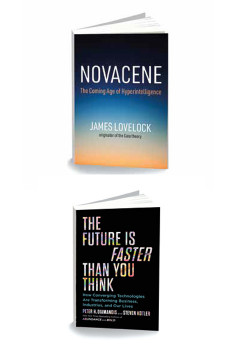READ - NOVACENE: THE COMING AGE OF HYPERINTELLIGENCE
NOVACENE: THE COMING AGE OF HYPERINTELLIGENCE
Imagine that there are hyper-intelligent beings who inhabit the Earth alongside us. They are carbon-based but not humanoid. In fact, they are probably spherical or square in shape. They can communicate telepathically and instantaneously perhaps using radiation to share their thoughts across vast distances. They can harness quantum power so as to be in two places at the same time. More importantly, they coexist with their human progenitors, curating the planet in order to keep it fit for their habitation.
James Lovelock, one of the greatest environmental thinkers of our time, has produced a new theory about the future of life on earth. He argues that the Anthropocene— the age in which humans acquired planetary-scale technologies—is coming to an end after 300 years. A new age—the Novacene—has already begun.
In the Novacene, he says, new beings will emerge from existing artificial intelligence systems. They will think 10,000 times faster than we do and they will regard us as we now regard plants. But this will not be the cruel, violent machine takeover of the planet imagined by science fiction. These hyper-intelligent beings will be as dependent on the health of the planet as we are. They will need the planetary cooling system to defend them from the increasing heat of the sun as much as we do.
It is crucial, Lovelock argues, that the intelligence of earth survives and prospers. He does not think there are intelligent aliens, so we are the only beings capable of understanding the cosmos. Perhaps, he speculates, the Novacene could even be the beginning of a process that will finally lead to intelligence suffusing the entire cosmos.
THE FUTURE IS FASTER THAN YOU THINK: HOW CONVERGING TECHNOLOGIES ARE TRANSFORMING BUSINESS, INDUSTRIES, AND OUR LIVES
In their book Abundance, authors and futurists Peter Diamandis and Steven Kotler tackled grand global challenges such as poverty, hunger, and energy. They chronicled the use of exponential technologies that allowed the emergence of powerful new entrepreneurs. Now, the authors are back with The Future Is Faster Than You Think; a blueprint for how our world will change in the next 10 years as a response to rapid technological disruption.
They say, “Technology is accelerating far more quickly than anyone could have imagined. During the next decade, we will experience more upheaval and create more wealth than we have in the past hundred years.”
In this roadmap to our near future, Diamandis and Kotler investigate how wave after wave of exponentially accelerating technologies will impact both our daily lives and society as a whole. They ask, “What happens as AI, robotics, virtual reality, digital biology, and sensors crash into 3D printing, block chain, and global gigabit networks? How will these convergences transform today’s legacy industries? What will happen to the way we raise our kids, govern our nations, and care for our planet?”
The Future is Faster Than You Think provides a look at what our future might look like, and our response to the changes that accompany it.








